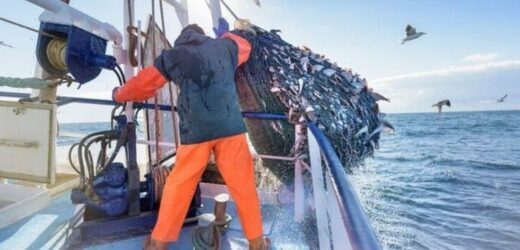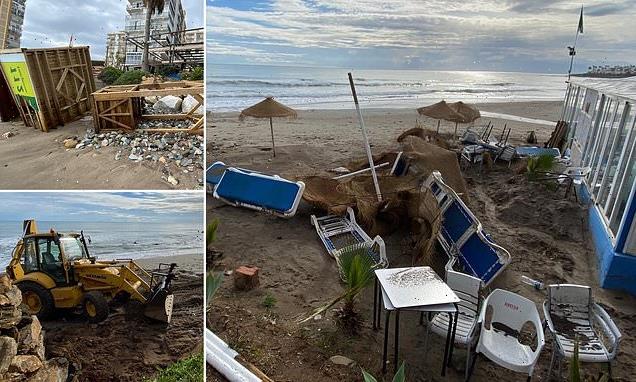French fisheries may be exposed in UK 'tit-for-tat' says expert
We use your sign-up to provide content in ways you’ve consented to and to improve our understanding of you. This may include adverts from us and 3rd parties based on our understanding. You can unsubscribe at any time. More info
Updated biannually by the Marine Conservation Society, the “Good Fish Guide” employs a six-point, traffic light-esque scale to rate UK seafood based on its level of sustainability. Ratings range from “Best Choice”, which is the most sustainably caught or responsibly farmed seafood, all the way down to “Fish to Avoid”. The latter covers seafood around which there are “significant environmental concerns” but “no credible work underway to make improvements”.
The Good Fish Guide’s ratings are based on various factors — including the environmental impact of the fishing activity, the influence this has on other marine life and volumes of bycatch.
It should be noted that individual ratings do not refer to a particular seafood species, but that of a species caught or farmed by a particular fishery.
According to the Marine Conservation Society, 14 ratings have recently been downgraded to the “Fish to Avoid” list — including monkfish from the North Sea and west of Scotland, some sources of crab and lobster, and many species of skates and rays.
In fact, most of the latter are now on the “Avoid” list. This had been caused in part, the experts said, by the use of combined catch limits for numerous species, which allows for individual species to be accidentally overfished while still adhering to the regulations.
The Marine Conservation Society said: “Management is therefore currently insufficient to protect them from overfishing.”
However, they added, ten seafood ratings from our waters have now secured a “Best Choice” ranking — including North Sea herring and sardines from the southwest UK.


Marine Conservation Society fisheries policy manager Clara Johnston said: “For a thriving industry, future food security and the health of our ocean, it’s crucial that the UK governments seize the new opportunities posed by the Joint Fisheries Statement and Fisheries Management Plans to fix our fisheries.
“The latest Good Fish Guide ratings – where all new UK ratings are either amber or red rated – illustrate the urgent need for transparency and better management if we’re to recover fish stocks in UK seas.”
Good Fish Guide manager Charlotte Coombes added: “The latest ratings on the Good Fish Guide highlight how better management of UK seas is needed to stop overfishing and protect wildlife.
“Currently, there are 656 ratings available on the Good Fish Guide, with 148 on the ‘Best Choice’ list. However, there are 161 ‘Fish to Avoid’.
“With all-new UK ratings to the Guide being either amber or red rated, it’s clear that we need interventions to turn the fate of the UK’s seas around.”


According to the Marine Conservation Society, fish caught in the Celtic Sea — off England and Wales’ southwest coastlines — exemplify the challenges faced by UK species.
Here, cod, haddock and whiting typically swim and feed together and thus often end up being together.
However, the levels of Celtic cod and whiting populations have been determined to be at “dangerously low” levels — impacting reproduction rates.
In fact, scientists have recommended that cod should not be caught in the Celtic Sea at all until the population has had the time to recover sufficiently.
Celtic haddock, meanwhile, have healthy population numbers but are still being caught at a rate that exceeds scientifically recommended limits.
The Marine Conservation Society said: “The more haddock that is caught, the more cod and whiting are caught alongside it.
“Management and enforcement measures clearly need improvement to help all three species to reach or stay at healthy levels.
“Ecosystem-based management, looking at all species caught together, would address many of these issues.”
DON’T MISS:
‘What a legacy for Merkel’ Germany humiliated as Russia sanctions fail [INSIGHT]
The deadly weapons UK could send to Ukraine to end Putin’s invasion [ANALYSIS]
Australian mystery after bloated ‘alien’ creature washes ashore [REPORT]
still

In the wake of the guide’s findings, the Future Fisheries Alliance — a collaborative project between the Marine Conservation Society, the WWF and the RSPB — is calling for the Government to strengthen the current draft of the Joint Fisheries Statement prior to its publication in November this year.
The statement is intended to set out an overarching policy direction for fisheries management and is said to be central to the Government’s ambition “to be a world-leading fisheries management nation and achieve fully sustainable fisheries.”
The drafting of the statement, the Marine Conservation Society told Express.co.uk, affords the UK the opportunity to set out “much needed” policy improvements to ensure “better control of our fisheries”.
The Future Fisheries Alliance has said that it wants to see the Joint Fisheries Statement time-bound commitments to both recover depleted fish stock via effective ecosystem-based management and to establish a “climate-smart” fisheries strategy that would incorporate measures to help reach net zero by 2050.
They are also calling for “urgent and effective action” to tackle wildlife bycatch in UK waters, as well as a “firm commitment” to roll out camera-based Remote Electronic Monitoring in vessels, which could provide data on the full impact of fishing on marine ecosystems.
Express.co.uk has reached out to the Department for Environment, Food and Rural Affairs (Defra) for comment.
The Good Fish Guide is published on the Marine Conservation Society website.
Source: Read Full Article


